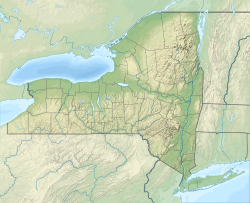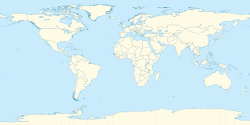Downtown Albany skyline from Rensselaer State Quad at SUNY Albany | |
| Etymology: Named for the Scottish Duke of Albany, whose title comes from the Gaelic name for Scotland: Alba | |
| Nicknames: | |
| Motto: Assiduity[d] | |
 Boundaries of and major thoroughfares through Albany | |
 Location of Albany in Albany County (upper left) and of Albany County in the State of New York (lower right) | |
Location of Albany within the State of New York Location within the United States Location within North America Location on Earth | |
| Coordinates: 42°39′09″N 073°45′26″W / 42.65250°N 73.75722°W | |
| Country | United States |
| State | New York |
| Region | Capital District |
| County | Albany |
| Settled | 1614 |
| Incorporated | 1686 |
| Government | |
| • Type | Strong mayor-council |
| • Mayor | Kathy Sheehan (D) |
| Area | |
| 21.94 sq mi (56.81 km2) | |
| • Land | 21.40 sq mi (55.44 km2) |
| • Water | 0.53 sq mi (1.38 km2) |
| • Metro | 2,811.6 sq mi (7,282 km2) |
| Elevation | 148 ft (45 m) |
| Highest elevation | 378 ft (115 m) |
| Lowest elevation | 2 ft (0.6 m) |
| Population (2020) | |
| 99,224 | |
• Estimate (2023) | 101,228 (US: 331st) |
| • Density | 4,730.28/sq mi (1,825.9/km2) |
| • Urban | 593,142 (US: 73rd) |
| • Urban density | 2,186.3/sq mi (844.1/km2) |
| • Metro | 1,170,483 (US: 63rd) |
| • Metro density | 416.3/sq mi (160.7/km2) |
| Demonym | Albanian[9] |
| Time zone | UTC−5 (EST) |
| • Summer (DST) | UTC−4 (EDT) |
| ZIP Codes | 12201–12212, 12214, 12220, 12222–12232 |
| Area codes | 518, 838 |
| Geocode | 977310, 978659 |
| ISO 3166 code | 36-01000 |
| FIPS code | 36-01000 |
| GNIS feature ID | 977310[7] |
| Website | albanyny.gov |
Albany (/ˈɔːlbəni/ AWL-bə-nee) is the capital and oldest city in the U.S. state of New York, and the seat of and most populous city in Albany County. It is located on the west bank of the Hudson River, about 10 miles (16 km) south of its confluence with the Mohawk River.
The city is the economic and cultural core of New York State's Capital District, a metropolitan area including the nearby cities and suburbs of Colonie, Troy, Schenectady, and Saratoga Springs. With an estimated population of 1.1 million in 2013, the Capital District is the third most populous metropolitan region in the state. As of 2023, Albany's population was 101,228.
The Hudson River area was originally inhabited by Algonquian-speaking Mohican.[10] The area was settled by Dutch colonists, who built Fort Nassau in 1614 for fur trading and Fort Orange in 1624. In 1664, the English took over the Dutch settlements, renaming the city Albany in honor of the Scottish title of the Duke of York (later James II of England and Ireland and James VII of Scotland): the Duke of Albany.[11][12] The city was officially chartered in 1686 under English rule. It became the capital of New York in 1797 after the formation of the United States. Albany is the oldest surviving settlement of the original British thirteen colonies north of Virginia.[13]
In the late 18th century and throughout most of the 19th, Albany was a center of trade and transportation. The city lies toward the north end of the navigable Hudson River. It was the original eastern terminus of the Erie Canal, connecting to the Great Lakes, and was home to some of the earliest railroads in the world. In the 1920s a powerful political machine controlled by the Democratic Party arose in Albany. In the latter part of the 20th century, Albany's population shrank because of urban sprawl and suburbanization. In the 1990s, the New York State Legislature approved for the city a US$234 million building and renovation plan, which spurred redevelopment downtown.[14] In the early 21st century, Albany's high-technology industry grew, with great strides in nanotechnology.[15][16]
- ^ Miles, Lion. "Mohican Dictionary" (PDF). Retrieved July 20, 2024.
- ^ Churchill, Chris (August 9, 2022). "Churchill: Kaloyeros was a Smalbany antidote". Times Union. Albany, New York. Retrieved January 3, 2023.
Garretson-Persans, C.M. (2016). The Smalbanac 2.0: An Opinionated Guide to New York's Capital District. Excelsior Editions. State University of New York Press. p. V. ISBN 978-1-4384-6360-5. Retrieved January 4, 2024. - ^ Platt, K. W., & Rincón, L. P. (2009). Latino Migration within New York State: Motivations and Settlement Experience.
"Insider's Guide: Albany isn't Smallbany". New York Makers. March 11, 2014. Retrieved January 4, 2024. - ^ "Albany" Archived October 29, 2009, at the Wayback Machine. Archived October 31, 2009.
- ^ Nearing, Brian (November 30, 2004). "Three Cheers for the Orange, White, and Blue". Times Union (Albany). Hearst Newspapers. p. B1. Archived from the original on April 30, 2011. Retrieved August 4, 2010.
- ^ "ArcGIS REST Services Directory". United States Census Bureau. Retrieved September 20, 2022.
- ^ a b "Geographic Names Information System". edits.nationalmap.gov. Retrieved May 8, 2023.
- ^ "NATIONAL WATER QUALITY ASSESSMENT PROGRAM - The Hudson River Basin". USGS. Retrieved March 2, 2020.
- ^ Cite error: The named reference
mceneny111was invoked but never defined (see the help page). - ^ "Peoples of the Hudson Valley | Weaving Together the Northeast". April 29, 2016. Archived from the original on September 13, 2021. Retrieved September 13, 2021.
- ^ "Why Albany?". Scotland Shop. Retrieved April 3, 2024.
- ^ "No. 2009". The London Gazette. February 16, 1684. p. 1.
- ^ Fitzpatrick, Edward (June 3, 1998). "312-Year-Old Document Shapes City's Government". Times Union (Albany). Hearst Newspapers. p. B4. Archived from the original on January 11, 2013. Retrieved June 18, 2010.
- ^ McEneny (2006), p. 201
- ^ Rulison, Larry (July 10, 2015). "Made in Albany: IBM reveals breakthrough chip made at SUNY Poly". Albany Times-Union. Retrieved July 12, 2015.
- ^ Klopott, Freeman; Wang, Xu; Ring, Niamh (September 27, 2011). "IBM, Intel Start $4.4 Billion in Chip Venture in New York". Bloomberg.com. Bloomberg. Retrieved July 12, 2015.
Cite error: There are <ref group=lower-alpha> tags or {{efn}} templates on this page, but the references will not show without a {{reflist|group=lower-alpha}} template or {{notelist}} template (see the help page).








![Official logo of Albany (Mohican: Paupautanwuthyauk)[1]](http://upload.wikimedia.org/wikipedia/commons/thumb/1/12/Coat_of_arms_of_Albany%2C_New_York.svg/100px-Coat_of_arms_of_Albany%2C_New_York.svg.png)



